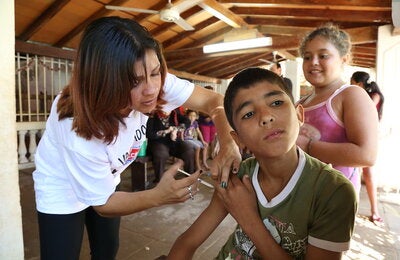
Governments are making limited progress, so more action is needed to address NCDs and main risk factors to meet global targets to reduce premature deaths
18 September, 2017 - Geneva/New York: Governments must step up efforts to control noncommunicable diseases (NCDs) to meet globally agreed targets, including preventing the premature deaths of millions of people from these conditions, according to a new WHO report released today.
Limited national progress has been made in the fight against NCDs - primarily cardiovascular and chronic respiratory diseases, cancers and diabetes - which are the world's biggest killers, and claim the lives of 15 million people aged 30 to 70 years annually.
But the WHO Noncommunicable disease Progress Monitor 2017, which charts actions by countries to set targets, implement policies to address four main shared and modifiable NCD risk factors (tobacco, unhealthy diet, physical inactivity and harmful use of alcohol) and build capacities to reduce and treat NCDs, shows that progress around the world has been uneven and insufficient.
In his foreword to the Monitor , Dr Tedros Adhanom Ghebreyesus, WHO Director-General, highlighted advances in responding to NCDs but urged further action, "Bolder political action is needed to address constraints in controlling NCDs, including the mobilization of domestic and external resources and safeguarding communities from interference by powerful economic operators."
The Progress Monitor provides data on 19 indicators in all of WHO's 194 Member States. The indicators include setting time-bound targets to reduce NCD deaths; developing all-of-government policies to address NCDs; implementing key tobacco demand reduction measures, measures to reduce harmful use of alcohol and unhealthy diets and promote physical activity; and strengthening health systems through primary health care and universal health coverage.
Key highlights of the 2017 edition include:
- 93 countries have set national targets to address NCDs, up from 59 in 2015
- 94 countries have implemented operational multisectoral strategies to address NCDs, compared to 64 in 2015;
- 90 countries have developed guidelines for managing the four major NCDs, up from 50 in 2015;
- 100 countries have conducted physical activity awareness campaigns;
- Six countries have not achieved any of the progress indicators, compared to 14 in 2015. Five of the six countries are African;
- Costa Rica and Iran lead the 10 the best performing countries, with each achieving 15 of the 19 indicators, followed by Brazil, Bulgaria, Turkey and the United Kingdom (each 13); Finland, Norway, Saudi Arabia and Thailand (12).
- No country from the WHO Africa region achieved more than eight of the progress indicators.
Dr Douglas Bettcher, WHO director for the prevention of NCDs, says the world is not on track to meet the target set by the Sustainable Development Goals of a one third reduction in premature NCD deaths by 2030.
"We need to urgently accelerate progress in the battle to beat NCDs," adds Dr Bettcher. "The window of opportunity to save lives is closing. This is playing out before our eyes in many ways, including in the increasing numbers of people, particularly children and adolescents, suffering from obesity, overweight and diabetes. If we don't take action now to protect people from NCDs, we will condemn today's and tomorrow's youth to lives of ill-health and reduced economic opportunities."
The Progress Monitor's findings will underpin a WHO report being submitted to the United Nations Secretary General later this year ahead of the third UN High-level Meeting on NCDs in 2018.
Situation in the Americas
In the Americas, NCDs are responsible for 80% (5.2 million) of all deaths. Thirty five percent of deaths caused by the four main NCDs, occurred prematurely in persons aged 30-70 years.
Progress in this Region presented in the 2017 monitoring report for the 35 Member States is as follows:
- Costa Rica and Brazil rank first and second among the top ten performing countries in the world, with 15 and 13 indicators being fully achieved, respectively;
- Colombia, Chile and Canada have fully achieved 10 of 19 indicators;
- 11 countries have developed national guidelines for managing NCDs, up from 7 in 2015;
- Regarding the Tobacco Control demand-reduction measures:
- 18 countries in the Americas have legislation banning smoking in indoor public places, workplaces and public transportation;
- 16 countries have implemented large graphic health warnings on tobacco packages, while,
- 15 countries, 11 of them States Parties to the FCTC, have not yet implemented any of the measures detailed above. And 17 countries are yet to establish smoke free environments in indoor public places and workplaces, and 19 countries have yet to implement mandatory health warnings.
- Costa Rica is the only country that has enacted and enforced bans or comprehensive restrictions on exposure to alcohol advertising (across multiple type of media); 5 countries have increased excise taxes on alcoholic beverages; and 5 countries have enacted and enforced restrictions on the physical availability of retailed alcohol (via reduced hours of sale)
- At least, 7 countries have adopted national policies to reduce population salt/sodium consumption;
- 9 countries have developed national policies that limit saturated fatty acids and eliminate trans fatty acids in the food supply,
- 10 countries implemented the WHO set of recommendations on marketing of foods and non-alcoholic beverages to children,
- 8 countries have legislation/regulations fully implementing the International Code of Marketing of Breast-milk Substitutes.
Editors note:
Member States requested WHO, at the January 2015 Executive Board, to produce the WHO Noncommunicable Diseases Progress Monitor. In May 2015, WHO published a technical note detailing the indicators to be used in the report. The World Health Assembly reiterated in 2016 that the Progress Monitor will be used to develop a report for the UN General Assembly in late 2017 on country efforts to develop national responses to address the four major main NCDs.
The WHO report also documents efforts by countries to implement a so called set of "best buys" and other interventions that can prevent or delay most premature NCD deaths, and which were endorsed during this year's World Health Assembly.
Such cost-effective and readily implementable measures include increasing taxation and plain packaging on tobacco products; reducing sodium content in food; providing drug therapy and counselling to people with diabetes and hypertension; and screening and vaccinating girls and women to protect them from cervical cancer.



